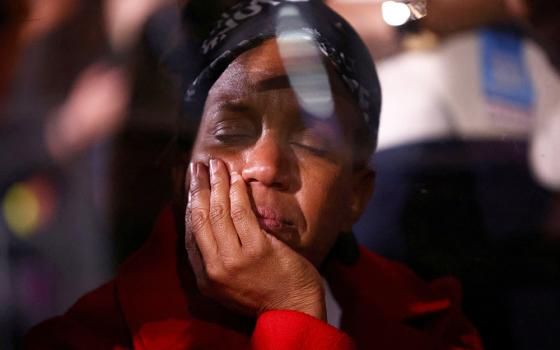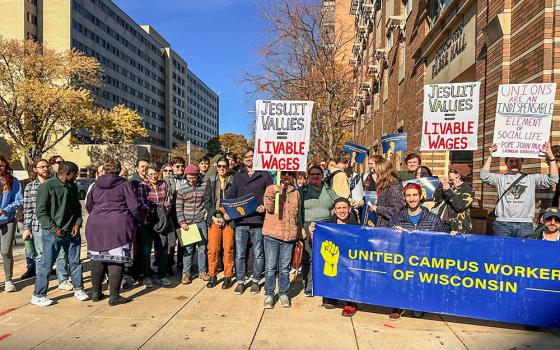I am deeply ambivalent about President Obama’s proposed “accommodation” regarding the HHS mandates. I was grateful I was in the car most of the day on Friday, and unable to offer immediate comment. When I listened to the President’s remarks, it seemed to me that the better part of wisdom was to say nothing over the weekend and, instead, first consult with people whose perspectives, knowledge and expertise I value. Alas, I am as ambivalent this morning as I was on Friday.
There is much to say on this topic, and it is difficult to neatly separate the ecclesial from the political issues. The debate over the past several months, and especially over the past three weeks, revealed a great deal about our culture at this moment but, nonetheless, I would like to try and focus this morning on the ecclesial significance of the decision.
First, it was a win no matter how you look at it. Three weeks ago, the storyline was that the President had made a decision that punched the Catholic Church in the nose but that he would probably get away with it because, after all, Americans do like their contraception, including American Catholics. I can assure you that you could have gotten good odds in Vegas on the proposition that the President would have to come to the White House briefing room within three weeks and walk back his initial decision. But, that is exactly what he did and the USCCB needs to recall the advice every high school football player knows from his coach: If you get into the end zone, behave like you’ve been there before. Act like a winner when you win.
Second, I think the first statement from the USCCB exactly captured the appropriate stance at this point: The president’s decision on Friday represents a good first step, but more needs to be done. To keep the football metaphor going, this was a touchdown, to be sure, but we haven’t won the game. And there is a difference between “shifting the goal posts” and addressing inadequacies in the decision, a difference everyone is well advised to mind. The political capital of the Church is pretty high right now, but we can lose it if we appear intransigent. Much better to say, “We won, but we still have reservations.”
There are some who have said this was not a win, that no touchdown was scored. For three weeks, Catholics across the ideological spectrum have joined forces to object to President Obama’s initial decision, announced on January 20, not to expand the narrow conscience exemption proposed last August. We expect some conservatives to attack Obama for anything he does, but when letters were read from pulpits throughout the land, and when Chris Matthews and E.J. Dionne and the editors of NCR all said the President had over-stepped, it became obvious that the president’s initial decision had ignited a firestorm. I do not think we would have achieved any movement from the White House had the bishops not been so forceful. I also doubt we would have had much movement if prominent liberal Catholics had not joined the cause.
Here is the lesson: When the Catholic Church stands united, the country must take notice. This issue of religious liberty, the idea that the government was going to start telling Notre Dame and Providence Hospital and Catholic Charities what they can and cannot do, resonates deeply in both American and American Catholic culture. (Yes, Virginia, there is a difference between the two.) The issue struck a chord that cut across the usual partisan divides. I think the key moment in the whole debate came when Chris Matthews said on his left-leaning talk show, “We Catholics grew up watching ‘A Man for All Seasons.’” This White House is filled with very smart people, but people who are smart in a certain kind of way. Policy they get. The power of historic, cultural memes, not so much. I wonder if Ms. Valerie Jarrett has ever seen “A Man for All Seasons” and, if so, what she thought of it.
But, conservatives who have already denounced the ruling need to re-watch that movie too – or read a good biography of St. Thomas More. Lest we forget, More really did try to find a way to sign the Oath before he concluded that he could not. He grasped that conscience cannot be violated but that we had to search for solutions “in the nettle of our minds.” Solutions, not posturing. In fact, More’s efforts to find an “accommodation” only made his subsequent decision that none could be found all the more heroic.
The president’s “accommodation” certainly deals with the essential issue that was raised the past three weeks – the coercion of the conscience of religious organizations in violation of our First Amendment rights. Some may dismiss his decision as gimmicky, which is an odd claim coming from Catholics whose faith contributed the word casuistry to our language. It is a fine word and a fine thing, one More approved. It is clear that no Catholic employer will have to do anything regarding the objectionable mandated care. We do not have to pay for it. We do not have to refer our employers or students to other organizations to acquire it. For weeks, many of us have been arguing with pro-choice advocates that the issue at hand was not contraception but the coercion of conscience. It would be strange indeed if we now had to have that argument with our conservative co-religionists.
That said, the way the President dealt with the issue is my main source of ambivalence. The nearly unanimous Catholic stance on the conscience exemption issue was more than tribal. The initial rule defined religious institutions in such a way that religion was considered something we do on Sunday and only amongst ourselves. This was the most insidious part of the initial decision and, sadly, the “accommodation” announced Friday does not alter that language at all. The bishops – and the rest of us – are correct to look for a legislative or judicial remedy.
In virtually every discussion or interview on this topic over the past few weeks, I was asked a question the premise of which was – isn’t this whole mess the result of the Catholic Church’s quirky position on sexual issues like contraception? The question is understandable, but it also shows how deep the bias of the media can be. Putting the words “sex” and “church” in the same sentence makes for good copy. But, the real reason the debate about the HHS mandate was seen as a “Catholic issue” was not just because of our quirky stance on contraception. At issue was an employer mandate, and the Catholic Church, more than any other ecclesiastical organization, employs and serves millions of our fellow Americans through our network of colleges, charities, hospitals and social service providers. Yet, no one ever asked me, “So why does the Catholic Church have so many colleges and hospitals and charities in the first place?” We do so because we believe religion is not just for Sunday mornings and not just for ourselves. Our faith leads us to conduct charity the rest of the week, and to aid all irrespective of their faith. It remains repugnant in the extreme to suggest, as the rule does – as it still does, that somehow our Catholic educational and charitable institutions are not integral to our faith.
On the other hand, the unity among Catholics will evaporate if the USCCB decides to go to the mat for the conscience rights of Taco Bell, to use a current and unfortunate example, the way we all just went to the mat for the conscience rights of Notre Dame. Given the performance of corporate America the past few decades, the suggestion that corporations have a conscience is debatable. More to the point, the differences between Taco Bell and Notre Dame are obvious to all: Catholic universities, for example, are permitted to give preferential treatment to Catholics in their hiring practices for the simple reason that you can’t have a Catholic college, or a Methodist one, without Catholics, or Methodists. Taco Bell cannot so discriminate. Besides, if all those letters from our bishops read in all those parishes over the past three weeks helped produce unanimity among Catholics, a letter extolling the conscience rights of Taco Bell would likely be met with laughter.
The concern expressed by the bishops in their second statement on Friday regarding self-insured organizations is very real but I have to believe that a solution can be found. We are not talking about a lot of people, mostly a few dioceses and some religious orders. Do Ms. Jarrett and her allies in the administration really want to go to the mat over the need to provide access to contraception for nuns? If they do, they will be laughed at too.
The bigger issue for me today is not how we, as Catholics, move forward on the issue of conscience exemption – I will discuss the politics of that tomorrow. The bigger issue is this: It is sad that we can’t point to a single other issue on which we could generate such unanimity among all the people in the pews. Yesterday, in his speech at the Catholic Social Ministry Gathering, John Carr noted that “the polarization in our political life is now felt in our ecclesial life.” I hope that in addition to trying to figure out a solution to the remaining issues regarding the HHS mandates, the bishops will take a step back and ask themselves, and then ask the rest of us, this question: How can we build up greater unity within our faith and bring that unity to bear on a host of issues?
It is a scandal – yes a scandal – that so many Catholic liberals recognize the dignity of the undocumented worker but not the dignity of the unborn child. And it is equally a scandal that so many conservative Catholics embrace the Church’s teaching on traditional marriage but adopt libertarian positions on economics that do violence to our Catholic beliefs about the common good and, indeed, about the nature of the human person. As we were reminded, ad nauseum, in the past three weeks, most Catholics in America do not share the Church’s teachings about contraception, but I am betting we could find other polls that show many Catholics do not share, if they are even aware, of Pope Benedict’s powerful teachings on the environment. Few Catholics indeed would recognize that there is a connection, a profound one, between the Church’s teachings on contraception and its teachings on the environment – more on that later in the week.
How then, or where, to look for a renewal of unity? Regular readers will be unsurprised if I point them in the direction of the New Evangelization. Ten years ago, in a cover story for The New Republic about the sex abuse crisis, I wrote these words and I stand by them today:
If the debate over the past few weeks demonstrated anything, it was that we continue to pay a huge price for participating in this reduction of religion to ethics. Confronting this will lead us into very difficult intellectual waters: Make no mistake about it my friends. The anthropology that undergirds the First Amendment is not Catholic anthropology and as much as some try to “baptize” the Constitution, the conception of freedom that animated the founding fathers is not the freedom of the children of God of which St. Paul wrote.
The debate also demonstrated something else, and it is something Catholics on both the political left and the political right also must grapple with. The Church should not fit too easily within this or any culture. We belong to two kingdoms and only one of them is in this world, and the claims of that other-worldly kingdom must come first. We stood together on this issue and we made a difference in this world, but that unity was born of our common love for the kingdom that is in the next.
N.B. Tomorrow, I will look at the politics of this issue and answer the question I have been asked dozens of times since Friday - Did the President's "accommodation" satisfy me enough that I have reconsidered my decision not to vote for Obama in November?




